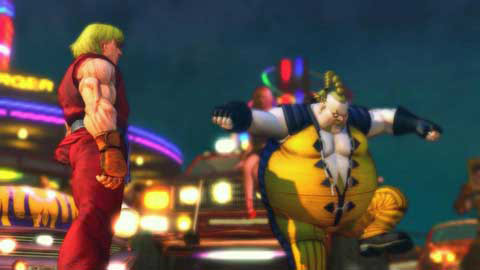Street Fighter, a legendary name in fighting games, is known for its diverse and often eccentric cast. Among them is Rufus, a character who immediately grabs attention, not just for his Kung-Fu moves, but for his… physique. While he might be initially perceived as a joke character due to his obesity, digging deeper reveals Rufus to be a fascinating commentary on American stereotypes and body image within the fighting game universe.

Rufus, alongside Tekken’s Bob, stands out in a genre dominated by sculpted physiques. In games where characters are typically lean and muscular, Rufus’s overweight appearance is deliberately contrasting. But is he simply a fat joke, or is there more to his character than meets the eye?
Who is Rufus? The American Stereotype Embodied
Rufus debuted in Street Fighter IV and is presented as an American fighter with a larger-than-life personality to match his size. He’s arrogant, self-absorbed, and lives under the delusion that he’s Ken Masters’ greatest rival and America’s top fighter – despite lacking any real recognition. He’s often played for comedic effect, with his weight being a central visual gag.

However, to dismiss Rufus solely as a fat joke is to overlook the layers of stereotypes he embodies. He taps into several common perceptions about Americans:
- Size and Obesity: Rufus’s most defining trait is his obesity, reflecting the stereotype of Americans being overweight.
- Arrogance and Loudness: He is boisterous, confident to the point of delusion, and embodies the stereotype of the “loud American.”
- Obsession with Being the Best: Rufus’s fabricated rivalry with Ken and his constant need to prove himself as the best fighter in America plays into the stereotype of American competitiveness and a desire for global dominance.
- American-centric View: His world revolves around his perception of America and his place within it, echoing the stereotype of Americans being overly patriotic and self-absorbed.
Beyond the Punchline: Rufus’s Fighting Prowess
Despite his comedic portrayal, Rufus is no slouch in a fight. He utilizes a unique and surprisingly agile form of Kung-Fu. His speed and unexpected agility directly contradict the stereotypes associated with his body type. This juxtaposition is key to understanding the nuanced commentary within his character design.

Like Bob from Tekken, Rufus challenges the trope of the “bumbling incompetent fat person.” He’s a skilled martial artist, capable of keeping up with and even defeating some of Street Fighter’s most iconic characters. This subversion is significant. In a society where overweight individuals are often portrayed negatively, Rufus stands as a capable and even formidable fighter.
Fat Acceptance and Body Representation in Gaming
Rufus’s existence in Street Fighter can be seen as a subtle nod towards fat acceptance, intentionally or not. In a gaming world filled with unrealistic body standards, Rufus presents an alternative. While many fighting game characters boast idealized, muscular physiques, Rufus breaks the mold.

This representation is relevant in the context of the fat acceptance movement, which challenges societal fat-shaming and promotes body positivity for people of all sizes. Rufus, in his own exaggerated way, embodies this defiance against narrow beauty standards. He is confident, skilled, and unapologetically himself, regardless of his size.
Is Rufus Problematic? Navigating Stereotypes
While Rufus can be seen as a progressive character in terms of body representation, the use of stereotypes is always a complex issue. Some might argue that Rufus reinforces negative stereotypes about Americans and overweight people, using his body as a constant source of humor.

However, others might see Rufus as a satirical take on these stereotypes. By exaggerating these traits, the character invites players to laugh at the absurdity of the stereotypes themselves, rather than at overweight people. The humor becomes self-aware, prompting reflection on societal biases.
The effectiveness of Rufus’s representation ultimately depends on individual interpretation. It highlights the challenge of limited representation: when only a few characters deviate from the norm, they carry a heavier burden of meaning and can be interpreted in multiple ways.
Rufus: A Step Towards Broader Representation?
Despite any potential pitfalls, Rufus remains a significant character in the landscape of fighting games. He dares to be different in a genre that often prioritizes idealized physiques. He opens up a conversation about body image and representation, even if through a comedic lens.
By including characters like Rufus, fighting games can move towards a more inclusive and diverse representation of body types. He may not be the perfect representation, but he’s a step away from the hyper-masculine and hyper-feminine norms that dominate the genre. Rufus shows that fighting game characters, and by extension, representations in media, can be more varied and reflective of the real world.
Conclusion: Rufus’s Enduring Appeal
Rufus from Street Fighter is more than just a punchline. He’s a complex character who uses humor to explore stereotypes about Americans and body image. While his portrayal might be debated, his presence in the Street Fighter universe is undeniable. He’s a reminder that fighting games, and media in general, have the potential to challenge norms and broaden our perspectives on representation. So, next time you see Rufus, remember there’s more to this Kung-Fu fighter than just his size – he’s a commentary, a conversation starter, and a surprisingly effective character in the world of Street Fighter.

